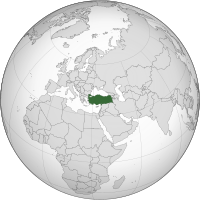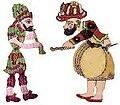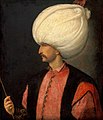Merhaba! Türkiye portalına hoş geldiniz. Hi! Welcome to the Türkiye portal.
 | |

| |
Turkey, officially the Republic of Türkiye, is a country mainly in Anatolia in West Asia, with a smaller part called East Thrace in Southeast Europe. It borders the Black Sea to the north; Georgia, Armenia, Azerbaijan, and Iran to the east; Iraq, Syria, and the Mediterranean Sea (and Cyprus) to the south; and the Aegean Sea, Greece, and Bulgaria to the west. Turkey is home to over 85 million people; most are ethnic Turks, while ethnic Kurds are the largest ethnic minority. Officially a secular state, Turkey has a Muslim-majority population. Ankara is Turkey's capital and second-largest city. Istanbul is its largest city, and its economic and financial center, as well as the largest city in Europe. Other major cities include İzmir, Bursa and Antalya.
Human habitation began in the Late Paleolithic. Home to important Neolithic sites like Göbekli Tepe and some of the earliest farming areas, present-day Turkey was inhabited by various ancient peoples. Hattians were assimilated by the Anatolian peoples. Classical Anatolia transitioned into cultural Hellenization following the conquests of Alexander the Great; Hellenization continued during the Roman and Byzantine eras. The Seljuk Turks began migrating into Anatolia in the 11th century, starting the Turkification process. The Seljuk Sultanate of Rum ruled Anatolia until the Mongol invasion in 1243, when it disintegrated into Turkish principalities. Beginning in 1299, the Ottomans united the principalities and expanded; Mehmed II conquered Istanbul in 1453. During the reigns of Selim I and Suleiman the Magnificent, the Ottoman Empire became a global power. From 1789 onwards, the empire saw major transformation, reforms, and centralization while its territory declined.
In the 19th and early 20th centuries, persecution of Muslims during the Ottoman contraction and in the Russian Empire resulted in large-scale loss of life and mass migration into modern-day Turkey from the Balkans, Caucasus, and Crimea. Under the control of the Three Pashas, the Ottoman Empire entered World War I in 1914, during which the Ottoman government committed genocides against its Armenian, Greek and Assyrian subjects. Following Ottoman defeat, the Turkish War of Independence resulted in the abolition of the sultanate and the signing of the Treaty of Lausanne. The Republic was proclaimed on 29 October 1923, modelled on the reforms initiated by the country's first president, Mustafa Kemal Atatürk. Turkey remained neutral during most of World War II, but was involved in the Korean War. Coups in 1960 and 1980 interrupted the transition to a multi-party system.
Turkey is an upper-middle-income and emerging country; its economy is the world's 18th-largest by nominal and 11th-largest by PPP-adjusted GDP. It is a unitary presidential republic. Turkey is a founding member of the OECD, G20, and Organization of Turkic States. With a geopolitically significant location, Turkey is a regional power and an early member of NATO. An EU candidate, Turkey is part of the EU Customs Union, CoE, OIC, and TURKSOY.
Turkey has coastal plains, a high central plateau, and various mountain ranges; its climate is temperate with harsher conditions in the interior. Home to three biodiversity hotspots, Turkey is prone to frequent earthquakes and is highly vulnerable to climate change. Turkey has universal healthcare, growing access to education, and increasing innovativeness. It is a leading TV content exporter. With 21 UNESCO World Heritage sites, 30 UNESCO intangible cultural heritage inscriptions, and a rich and diverse cuisine, Turkey is the fourth most visited country in the world. (Full article...)
Selected article -
The Walls of Constantinople (Turkish: Konstantinopolis Surları; Greek: Τείχη της Κωνσταντινουπόλης) are a series of defensive stone walls that have surrounded and protected the city of Constantinople (today Istanbul in Turkey) since its founding as the new capital of the Roman Empire by Constantine the Great. With numerous additions and modifications during their history, they were the last great fortification system of antiquity, and one of the most complex and elaborate systems ever built.
Initially built by Constantine the Great, the walls surrounded the new city on all sides, protecting it against attack from both sea and land. As the city grew, the famous double line of the Theodosian Walls was built in the 5th century. Although the other sections of the walls were less elaborate, they were, when well-manned, almost impregnable for any medieval besieger. They saved the city, and the Byzantine Empire with it, during sieges by the Avar–Sassanian coalition, Arabs, Rus', and Bulgars, among others. The fortifications retained their usefulness after the advent of gunpowder siege cannons, which played a part in the city's fall to Ottoman forces in 1453 but were not able to breach its walls. (Full article...)General images
Did you know -
- ... that Ottoman architect Mimar Sinan erected a Koranic school and an elementary school near the Ese Kapi Mosque in Istanbul? (May 9, 2012)
- ... that Yalçın Granit became the first Turkish basketballer to play in a European team when he went to France for his doctoral studies? (May 8, 2014)
- ... that the crash of Turkish Airlines Flight 634 on 8 January 2003 was the worst crash involving a BAe 146? (January 4, 2009) Wikipedia:Recent additions 238
- ... that Süreyya Opera House in Istanbul, built in 1927 as a musical theater but used all the time as a cinema, gained its intended status only in 2007 after redevelopment? (October 30, 2008) Wikipedia:Recent additions 234
- ... that the Grand Bazaar in Istanbul, one of the largest covered markets in the world, attracts between 250,000 and 400,000 visitors daily? (March 19, 2012)
- ... that visitors to the Ulucanlar Prison Museum who pay extra to be handcuffed and locked in an isolation cell for a limited time may not leave it before the agreed time is up? (April 26, 2013)
- ... that the Turkish tanbur is one of the four musical instruments that make up Turkish classical music's basic quartet? (May 23, 2007)
Selected picture
Selected biography -
Sıla Gençoğlu (born 17 June 1980) is a Turkish singer-songwriter. She was born in Acıpayam, Denizli, and later moved to İzmir and then to Istanbul to finish her studies. She started to learn performing arts at high school. After studying jazz at Istanbul Bilgi University, she became a backing vocalist for Kenan Doğulu.
Sıla released her self-titled debut album in 2007. The song "...Dan Sonra" became a number-one hit on Türkçe Top 20, and after critical and commercial success she released the albums İmza (2009), Konuşmadığımız Şeyler Var (2010), Vaveyla (2012), Yeni Ay (2014) and Mürekkep (2016) all of which were praised by fans and critics alike. A number of songs in these albums, including "Sevişmeden Uyumayalım", "Acısa da Öldürmez", "Kafa", "Boş Yere", "Vaziyetler", "Yabancı" and "Hediye", became number-one hits in Turkey. The songs "Yoruldum", "İmkânsız" and "Zor Sevdiğimden" ranked among the top five on Turkey's music charts. (Full article...)Selected video -
Selected quote -
| “ | A satiated man doesn't know what's hunger, a healthy man doesn't know what's disease. | ” |
Recognized content
Provinces
Related portals
Religions in Turkey
Neighbouring countries
Countries with related heritage
WikiProjects
Turkish wikipedia
 |
There is a Turkish version of Wikipedia, the free encyclopedia. |
Wikimedia
The following Wikimedia Foundation sister projects provide more on this subject:
-
 Commons
Commons
Free media repository -
 Wikibooks
Wikibooks
Free textbooks and manuals -
 Wikidata
Wikidata
Free knowledge base -
 Wikinews
Wikinews
Free-content news -
 Wikiquote
Wikiquote
Collection of quotations -
 Wikisource
Wikisource
Free-content library -
 Wikiversity
Wikiversity
Free learning tools -
 Wikivoyage
Wikivoyage
Free travel guide -
 Wiktionary
Wiktionary
Dictionary and thesaurus
-

-

-

-

-
Random portal




































































































Recent Comments